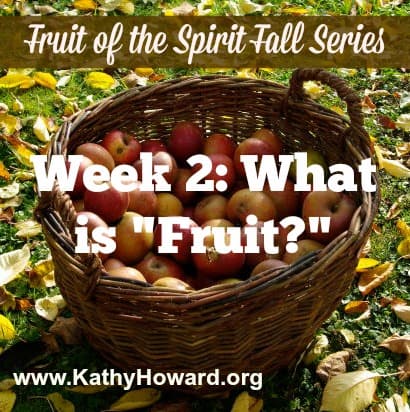This post is the second lesson in a 6-week study series on the Fruit of the Spirit. (See the intro post here or the first week here.) You can read today’s post and make notes in a journal or print the PDF version!
When my kids were little they loved watching Veggie Tales. Their favorite Veggie Tale characters were Bob and Larry – a tomato and cucumber, respectively. If you are also a Veggie Tales fan, you might want to sit down because I am about to shake things up. Larry and Bob aren’t vegetables! To be botanically correct, tomatoes and cucumbers are fruits!
It really doesn’t matter if we consider a tomato to be a fruit or a vegetable. But we do need a good understanding of the “fruit of the Spirit.” Over the next few weeks we will plant God’s truth about spiritual fruit in our hearts, cultivate our lives to receive it, and take action to help it grow! Today we’ll take a closer look at what the “fruit of the Spirit” is and what it is not.
Read our focal passage, Galatians 5:16-26.
The word “fruit” used in Galatians 5:22 is the Greek word “karpos.” According to Mounces Complete Expository Dictionary, “karpos” refers to the natural product of something that is alive. Literally, it’s used of the product of trees, vines, and crops. But it’s also used metaphorically to refer to the natural product of a spiritual being. Paul uses it to contrast what our sinful natures naturally produce with what the Holy Spirit naturally produces.
Plant: Prerequisite to Growing Spiritual Fruit
The obvious prerequisite to producing the “fruit of the Spirit” is the presence of the Spirit. Let’s see what the Bible says about the indwelling presence of the Holy Spirit and His work in us.
Read Romans 8:9-11. Which of the following statements are True? Which are false?
___ You can be a Christian without having the Holy Spirit.
___ If you do not have the Spirit you do not belong to Christ.
___ If you belong to Christ then you have His Spirit.
Read Ephesians 1:13-14. Which of the following statements are true?
___ We receive the Holy Spirit through faith in Christ.
___ The Holy Spirit “marks” us as belonging to God.
___ The Spirit is our “guarantee” that we will receive all God’s promises.
At one time, we were all spiritually dead in our sins (Ephesians 2:1). We could do nothing to save ourselves. But in God’s great kindness and mercy, He sent His Son to pay the penalty our sins deserve (Romans 6:23). Jesus’ death on the cross makes our salvation possible. We cross over from death to life by God’s grace, through faith in Christ and spiritual regeneration by the Holy Spirit (Titus 3:3-7). The indwelling presence of God’s Spirit guarantees our eternal salvation (Ephesians 1:13-14). (If you don’t have a saving relationship with Jesus or aren’t sure, read “How to Have a Relationship with Jesus.”)
Cultivate: Two Key Facts about the Fruit of the Spirit
Let’s get a better understanding of the Fruit of the Spirit by exploring two key facts.
Fact #1: “Fruit” is the natural by-product of the Spirit in a Christian’s life.
Read 2 Corinthians 3:17-18 from the New Living Translation below:
7 For the Lord is the Spirit, and wherever the Spirit of the Lord is, there is freedom. 18 So all of us who have had that veil removed can see and reflect the glory of the Lord. And the Lord—who is the Spirit—makes us more and more like him as we are changed into his glorious image.
The Spirit has work to do in the life of a believer. According to 2 Corinthians 3:18, what is the work of the Spirit in our lives?
From the moment of salvation until the end of our lives on this earth, the Spirit of God works in believers to transform our nature and character into that of Christ’s. God’s goal for all His children is for us to be like Jesus (Romans 8:29). Therefore, the Holy Spirit is constantly working to rid our lives of the “acts of the sinful nature” (Galatians 5:19) and conform us into the image of Christ. “Fruit of the Spirit” is evidence that our character is becoming like Christ’s.
Fact #2: “Fruit of the Spirit” is not the same as “spiritual gifts.”
We’ve learned that “fruit of the Spirit” is the development of Christ’s character in the life of a believer. Now let’s take a look at what this “fruit” is not.
Read 1 Corinthians 12:4-11.
Although the Spirit is the source of both, His “gifts” and “fruit” are not the same. There are a multitude of different kinds of gifts but an individual only receives what the Holy Spirit determines to give. However the “fruit” of the Spirit should be common to all Christians. The word “karpos” is singular signifying that “fruit” is a unified whole. As we grow in Christ-likeness we will produce all the characteristics of His nature.
Grow: A Challenge to Know the Fruit
I want my life to increasingly produce the “Fruit of the Spirit.” How about you? As a solid reminder of what our lives should look like, will you join me in memorizing Galatians 5:22-23? Let’s do it?
Let’s talk. Will you take the Scripture memory challenge? How has today’s lesson helped you understand the “Fruit of the Spirit?” What stood out to you the most in what we discussed?



Titus Bible Study
Join Kathy's mailing list to receive a free mini Bible study on the book of Titus.
Success! Check your inbox for the download link.